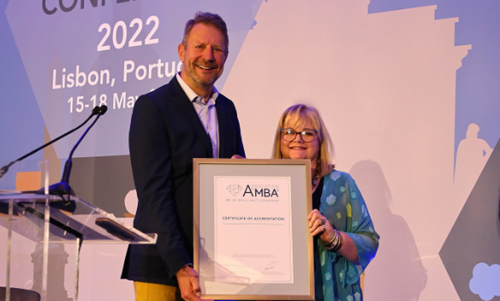23 June 2022

Written by Dr Jane Usher - HOD, Milpark Business School
In what many see as a turning point for postgraduate business education, online MBA students overtook in-person MBA enrollments for the first time for the 2020-2021 academic year. Meanwhile, employers are also coming around to the idea of online qualifications: 71% of employers now regard online business degrees as equal or better in quality than traditional programmes. This number rose by 10% from 2019, as shown in a study by the Center for the Future of Higher Education and Talent.
Whether or not this information is cause for worry or celebration depends on how traditional or progressive a business school is. However, the recent AMBA & BGA Global Conference 2022 revealed further education trends that many business schools have embraced and implemented. This year delegates heard presentations about how business education is changing, the importance of student wellbeing, the need for diversity and the necessity of research that informs curriculum and best practice. But one of the most talked-about presentations came from Roger James Hamilton, a world-renowned futurist, author and co-founder of the global Genius Schools.
Hamilton referred to the coming age of the metaverse -- or virtual worlds accessed via 3D technology, initially through headsets or special glasses. Many people were unfamiliar with the term (save for online gaming enthusiasts) until late October 2021, when Facebook founder Mark Zuckerberg announced his plans to transform Facebook into a metaverse -- essentially a 3D space. Since then, much conversation and speculation have ensued about what the metaverse really is. Put simply; it is a fully-immersive 3D world, similar to the worlds created in computer and console games like Fortnite, Call of Duty and Roblox.
Hamilton emphasised that we are on the brink of a pivotal moment in tech history, what he describes as the next frontier in online interaction. He believes the metaverse has the power to end the internet as we know it. “Imagine a world like our real world,” he said, “but one where you can meet, shop, go to school, play games, be creative, be whoever you want to be, all while teleporting and time travelling to wherever you want to go.”
What does this mean for education? For many of us who have watched the shift to online education occur faster than anticipated, the possibilities of the metaverse are intriguing. We have already seen how receptive students are to video lectures and how much easier they find engaging in online environments, group discussions and peer interaction on these platforms. How could education in the metaverse help students become even more stimulated and engaged?
Imagine students in a business school programme interacting in a virtual office, taking part in a board meeting or pitching presentations to peers -- perhaps even testing out business models or doing market research. Imagine a lecturer taking students into a virtual factory to help demonstrate supply line issues firsthand.
“In the next decade, for better or for worse, this is all going to be a reality,” said Hamilton, “The internet and mobile phone will be just as much a relic tomorrow as pagers and fax machines are today.” Hamilton thinks that by 2024, we will be spending more time in 3D virtual worlds than in 2D reality.
Whether this will actually come to pass remains to be seen. Already there are platforms where virtual reality is being used to improve learning and engagement. Biology students can watch frog dissecting videos made in virtual reality, which helps schools cut down on the costs of procuring frogs and, of course, the need to sacrifice them for experiments. When viewed through new technology, history lessons come to life and become more riveting, like a simulation of the 1943 Berlin Blitz during the Second World War, where virtual reality is used to provide visuals from the inside of a Lancaster Bomber accompanied by an actual radio clip of the time.
According to Raquel Ribeiro, blog author for the Cambridge University Press & Assessment, the immediate value of virtual reality in education is in helping teachers manage classrooms and create immersive learning experiences. She describes how she helped her students learning English stay better engaged during COVID-19.
Within the excitement and possibilities of the metaverse and its uses, we as educators need to keep having conversations and ensuring that educators and students are aware of the unforeseen consequences of this trend. We need to reflect on the part that ethics plays in this arena and how we, as responsible educators, ensure that we are aware of both the positives and the pitfalls of the metaverse.
While some experts’ more radical projections about the future role of the metaverse call for more discussion, there can be no denying that this new technology is headed our way. It makes for exciting times for educators, who can unlock learning for a generation of young people who are already choosing virtual reality as their preferred entertainment medium. The industry is currently larger than the film and music industries combined, with an estimated 3.2 billion gamers worldwide.
As we’ve seen, tertiary education is already changing. At present, online or hybrid classrooms seem to be gaining prominence as preferred education platforms. These include combinations of in-person lectures coupled with online facilitation, instructions, videos and additional resources. An exciting element of online education is when students can co-curate knowledge and information. This engages students even more as they see that their voice matters in knowledge creation.
In a world where many learning institutions face increasing financial pressures, we cannot afford to ignore how students want to engage. The role of business schools in shaping future leaders and changemakers can only expand if we are able to open ourselves to new ways of thinking -- and technologies -- whatever they may hold.
Dr Jane Usher is the Head of Department: Postgraduate Studies at the Milpark Business School (MBS) for the MBA Programme and PGDBA programme.
https://cps.northeastern.edu/wp-content/uploads/2021/03/Online_Ed_in_2019.pdf